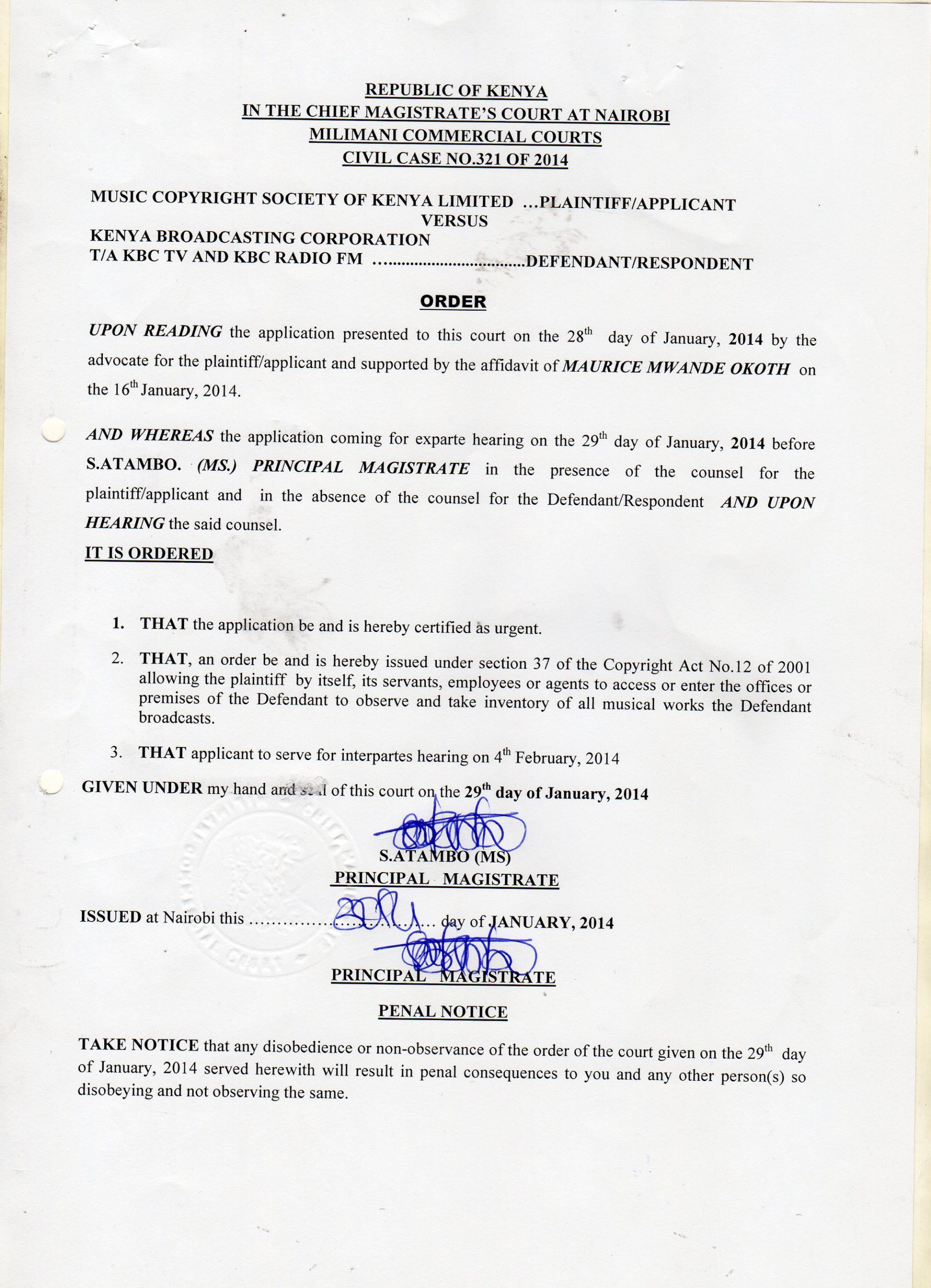Anton Piller Orders Issued Against Major Broadcasters for Intellectual Property Rights Breach
- Victor Nzomo |
- January 31, 2014 |
- CIPIT Insights,
- Collective Management Organisations,
- Copyright
BREAKING: @PoliceKE in the company of @theMCSK raids @onefmke for copyright infringement in their broadcasting operations!
— MCSK (@TheMCSK) January 31, 2014
IPKenya has been informed that the Music Copyright Society of Kenya (MCSK) conducted raids on two broadcasting stations, namely the popular urban radio station, One FM and the national broadcaster, Kenya Broadcasting Corporation (KBC) on January 31, 2014. These raids were carried out after MCSK successfully obtained Anton Piller orders in suits filed for copyright infringement.
In its application for Anton Piller orders against the two stations, MCSK’s lawyers relied on the following two grounds:
“1. The Defendant is engaged in and will continue to be engaged in unlawful broadcasting and reproduction of copyrighted musical works falling within the Plaintiff’s repertoire. Therefore this application seeks to enable the Plaintiff to take inventory and seize digital database(s) and libraries of musical works, related records and documents in the premises of the Defendant.
2. The Plaintiff has a well-founded apprehension that infringing copies of fixations of copyrighted musical works and related materials in possession of the Defendant will be hidden, disappear or will not be available at the time of the hearing unless this matter is heard as a matter of urgency and the orders sought granted.”
In the case of KBC, MCSK alleges that the national broadcaster owes over KES 3,000,000 in royalty arrears since 2012. This figure encompasses the controlled music content in KBC’s television station Channel One as well as its radio station. However, according to MCSK, the case of One FM illustrates the most flagrant infringement of copyright as the radio station has never taken out a broadcasting license from MCSK despite being in operation for several years. One FM’s royalty arrears are estimated to be well over KES 4,000,000.
On hearing the application by MCSK, the Court sitting at Milimani ordered that an order be issued under section 37 of the Copyright Act allowing MCSK by itself, its servants, employees or agents to access or enter the offices or premises of the Defendnat to observe and take inventory of all musical works the infringing stations broadcast.
A copy of the court order obtained against KBC can be viewed below. A similar order was issued against One FM:

In a recent press statement, the Chief Executive at MCSK states:
“MCSK has over the past years been negotiating with some of the defaulting broadcasters and it was after lengthy negotiations where ONE FM, KBC and others in the pipeline, failed, refused and / or neglected to comply with the legal requirement for taking of broadcasting license from MCSK. There are several other broadcasting stations that have been lined up for Court action if they do not acquire the MCSK license such as MEDIA MAX LTD, SOUND ASIA.
MCSK shall be seeking a permanent injunction to restrain both ONE FM and KBC from broadcasting any and all musical works in KENYA since MCSK controls both local and international works. This could then mean that both ONE FM and KBC will be off air when the permanent injunction is granted.
It really would be a shame since the two media houses have positioned themselves as promoting local music yet they are not paying royalties. The local musicians who they seek to promote cannot at all benefit since no monies are paid to them by MCSK since no royalties are paid by the said media houses.”
Comment:
The recent Annual Global Economic Survey of Authors’ Society Royalty Collections by International Confederation of Authors and Composers Societies (CISAC) reveals that 7.8 Billion Euros was collected worldwide. 75% of these collections were from public performance royalties, which is predominantly made up of collections from broadcasters. Within the CISAC African region, MCSK is ranked in the top 3 highest royalty earners despite broadcasters in Kenya being among the lowest royalty payers in proportion to their music usage. It is estimated that MCSK stands to collect over KES 110,000,000 in royalty arrears from television and radio broadcasters spread throughout the country.
Current statistics from the Communication Commission of Kenya (CCK) indicate that there are over 100 licensed FM frequencies and over 15 TV frequencies therefore MCSK ought to be collecting about KES 52,000,000 annually in broadcasting royalties alone!
This situation will become even more interesting as Kenya expects a sharp rise in broadcasters once digital migration finally receives the green light from the Court of Appeal.
